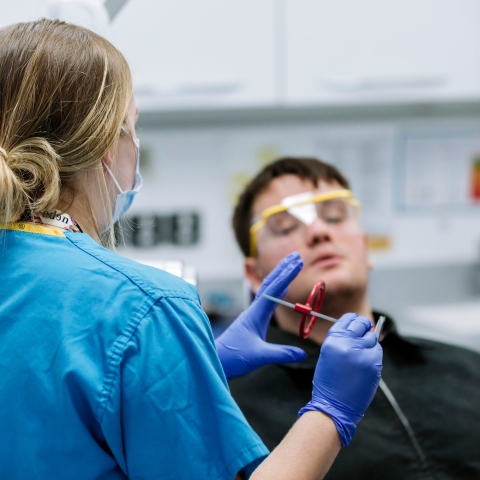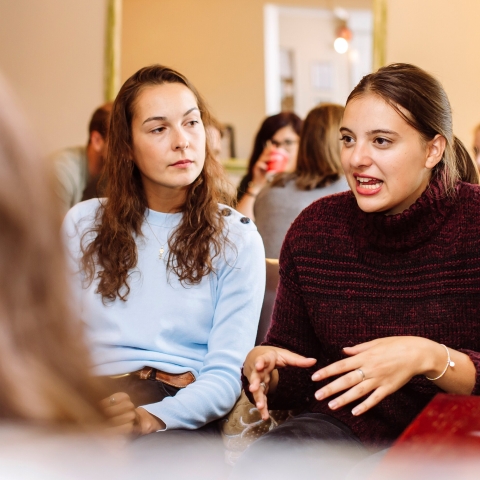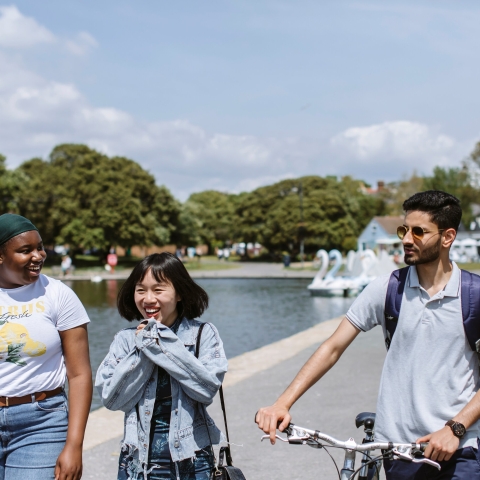

Our distinctive approach to transformational learning and how it can help you excel
As a student here, we want you to fulfil your potential and have a life-changing uni experience. At the heart of this is the personalised academic and pastoral support we offer, with a focus on wellbeing and resilience.
Wellbeing for learning
As the hub for our whole-university approach to wellbeing, Student Wellbeing informs the support we offer. It's all about recognising the vital role of emotions and emotion regulation for successful learning.
Understanding better how our human emotions have evolved is the starting point for learning skills for being a better friend to yourself and for building the supportive networks with others which will help you succeed in your valued learning and life goals.
Being a better friend to yourself and others
At Portsmouth we want to make sure you know that you belong, and feel welcomed into our inclusive learning community. We want every student to know about all the support networks available to them, and to have the skills to make use of these support networks and contribute to supporting others.
We believe that you are one of your own most important potential supporters. Being a better friend to yourself means taking care of your own wellbeing and treating yourself with kindness and compassion instead of self-criticism.
Mapping your support network
Supportive connections are essential resources for successful study and a flourishing life. At Portsmouth we encourage you to map out your own customised support network, and to keep strengthening the supportive connections that will help you succeed.
Your map should include the named people in your inner circles, occasional options in the middle circles and possible/potential services and options at the outer circles. What can you do to bring more people onto the map and/or closer to the centre?
- Study – All the people and resources there to support your study directly.
Your personal tutor, dissertation or research supervisor/s, course leader and lecturers. Your faculty learning support tutors and/or engagement officers. Personal tutor or seminar group peers. Informal study groups. Your faculty MyPort hub staff. Library and library staff. Moodle resources. ASK and Disability Advice. Maths Cafe. Global Cafe.
- Personal/social – Your everyday network. The people you can count on as well as those you have fun with. Your role models and personal mentors.
Your close family and loved ones. Wider family or home community networks. Your friendship network, old and new. Your housemates. Students Union groups or networks you belong to. Special interest groups (eg football team supporter). Work colleagues. Student Ambassadors. Mentors, advisers and sources of inspiration.
- Other – All the other supportive services available to you.
Your doctor and other external professionals. Student Services – Res Life team, Student Wellbeing, Chaplaincy, Student Life, Student Money, Student Housing, Disability Advice, UPSU Advice Centre, Sort It Out Service, Global Cafe, Get Connected, Careers and Employability.
- Self – What you can do to support yourself and your own wellbeing.
Gym membership, regular sport/exercise/physical activity, mindfulness practice, hobbies, healthy eating, sleep pattern, personal safety plan, values, faith/religious practice, volunteering, online courses and self-help resources, Get Connected and Feel Good Fest.
The Portsmouth 5 Ways to Wellbeing
The well-known 5 Ways to Wellbeing list is based on research evidence supporting these 5 simple ways to improve your sense of wellbeing:
- Connect – building our human connections will support and enrich us every day.
- Give – recognising that our happiness is linked to the wellbeing of the wider community can be rewarding and creates lasting connections with the people around us.
- Be active – engaging in regular purposeful activity, especially physical activity, will invigorate and energise us while keeping us in good health.
- Take notice – becoming more aware of the world around us helps to appreciate what really matters.
- Keep learning – setting ourselves challenges we will enjoy achieving can be fun and builds confidence and improves wellbeing.
We promote the 5 Ways to Wellbeing with a Portsmouth twist – linking the evidence-based 5 ways with the 5 values in our Student Charter.
5 Ways to Wellbeing at Portsmouth
How the Student Charter supports your wellbeing for successful learning:
Connect
Connect with the people around you: your family, friends, colleagues, neighbours, and people you encounter day to day. Smile, say thank you, listen, reach out. Spend time developing these relationships.
Give to others
Even the smallest act can count, whether it’s a smile, a thank you or a kind word; or being there to listen when someone needs to talk. Larger acts, such as volunteering or playing a formal supportive role can also help you build new social networks.
Be active
Find an activity you enjoy and make it a regular part of your life. Try to make sure this includes some physical activity – even if it’s just walking or cycling to classes rather than catching the bus.
Take notice
Be more aware of the present moment, including your thoughts, feelings, body and the world around you. Be better placed to appreciate what matters and what you value.
Keep learning
Stay in touch with the joy of learning both inside and outside your subject. Take pleasure in learning new skills and in the steps towards mastering your subject. Don’t get so focused on achievements and goals that you lose sight of what fascinates and intrigues you.
Student Charter: Support
Seek out and nurture strong support networks and partnerships to help meet your academic, career and personal goals.
Build and strengthen your supportive connections with the people around you at university and keep in touch with family and home community networks too. Recognise and make use of all the supportive resources around you.
Student Charter: Community
Play your part in welcoming others into diverse, inclusive, global and local communities where ideas are shared, opinions are sought, and views are valued.
Reach out to others and help build our inclusive learning community. Make the effort to pronounce someone’s name correctly. Include someone who seems lonely or isolated. Step up to intervene if someone is being badly treated.
Student Charter: Opportunity
Embrace challenges, be intellectually curious, and seize the broad range of opportunities provided within and beyond the curriculum.
Take advantage of the great value deals on sport membership and explore all the activities on offer – there’s something for everyone. Or join a Students’ Union group, get involved in music or drama, learn a language.
Student Charter: Respect
Value the people you meet and the places you study, work, and live; be a role model in the ways you treat people with respect, equity and dignity.
Take a deep breath, slow down, and be mindful of yourself, others and your surroundings. Stay in touch with your values. Treat both yourself and others with respect.
Student Charter: Education
Commit wholeheartedly to a stimulating learning environment, provide and respond to timely feedback, and push the boundaries of your subject.
Engage with all the learning opportunities on offer and see every piece of feedback as an opportunity to grow. Embrace the wonder of your subject and the opportunity to contribute to the growth of our collective knowledge.
Read these next:
Enable University alerts
Turn on notifications for critical updates like closures, safety alerts, and urgent service disruptions.








